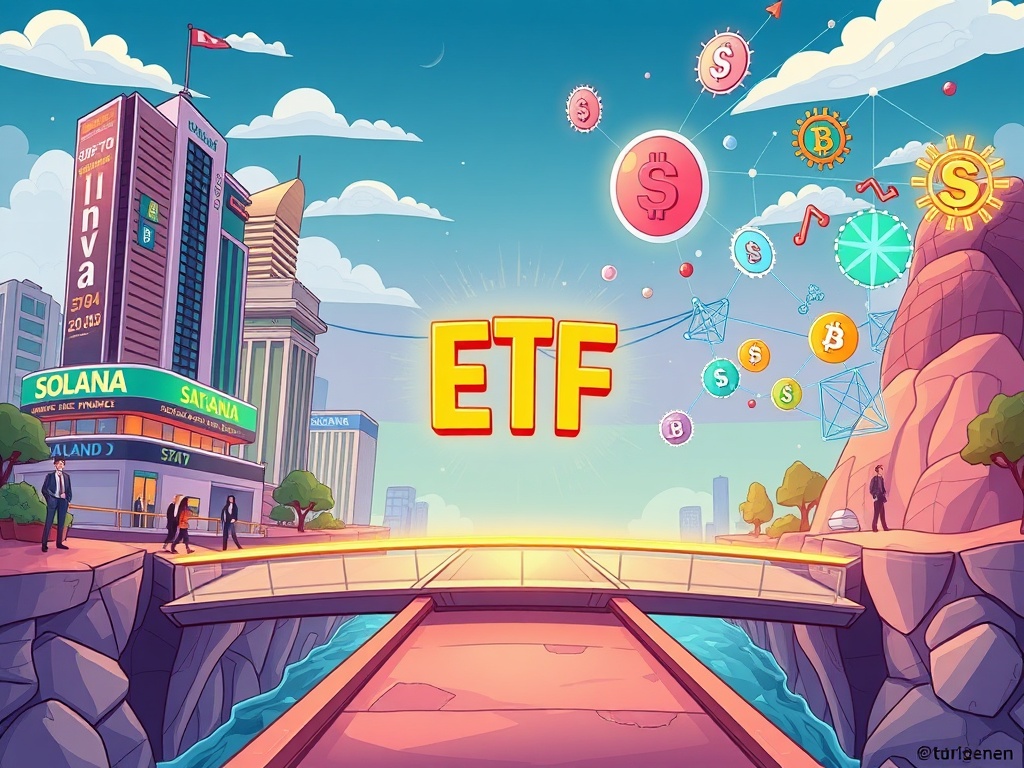BitcoinWorld

Revolutionary Solana Staking ETF: CoinShares Paves the Way for Institutional Adoption
Are you ready for another seismic shift in the world of digital assets? Just as Bitcoin and Ethereum exchange-traded funds (ETFs) have begun to reshape how traditional investors access cryptocurrency, a new frontier is emerging. CoinShares, a prominent European digital asset investment firm, is making waves by registering an entity for a proposed Solana staking ETF in Delaware, U.S. This isn’t just another regulatory filing; it’s a powerful signal that the institutional appetite for crypto is expanding beyond the established giants and delving into the dynamic world of altcoins and their unique earning mechanisms like staking.
Understanding the Game Changer: What is a Solana Staking ETF?
Before we dive deeper into CoinShares’ strategic move, let’s break down what a Solana staking ETF actually entails. For many, the concept might sound complex, but it’s essentially a fusion of two well-known financial instruments and a fundamental blockchain mechanism:
- Exchange-Traded Fund (ETF): Think of an ETF as a basket of assets that trades on traditional stock exchanges, much like a company stock. It allows investors to gain exposure to an underlying asset or group of assets without directly owning them. For instance, a gold ETF tracks the price of gold, allowing you to invest in gold without buying physical bars.
- Staking: In the crypto world, staking is a way to earn rewards by holding and ‘locking up’ your cryptocurrency to support the operations of a blockchain network. Solana, like many modern blockchains, uses a Proof-of-Stake (PoS) consensus mechanism. By staking your SOL tokens, you contribute to the network’s security and validation process, and in return, you earn new SOL tokens as rewards. It’s akin to earning interest in a traditional savings account, but on a blockchain.
So, a Solana staking ETF would be a financial product that holds Solana (SOL) tokens and actively stakes them on behalf of its investors. This means that if you invest in such an ETF, you wouldn’t need to manage your own crypto wallet, understand staking protocols, or worry about the technical complexities of participating in the Solana network. The ETF provider, in this case, CoinShares, would handle all of that, passing on the staking rewards to you, the investor, potentially in the form of increased NAV (Net Asset Value) or distributions. It’s a seamless bridge between traditional investment vehicles and the lucrative world of crypto yield generation.
CoinShares’ Bold Move: Pioneering the Solana Staking ETF
CoinShares is no stranger to innovation in the digital asset space. With a long-standing reputation as a leader in crypto investment products, their decision to register an entity for a proposed Solana staking ETF in Delaware, U.S., carries significant weight. But why Delaware, and why now?
Delaware is a popular choice for corporate registrations due to its business-friendly laws and well-established legal framework, often serving as a preliminary step for financial products seeking broader regulatory approval. This registration signifies CoinShares’ serious intent to bring this product to market, even as the regulatory landscape for crypto in the U.S. continues to evolve.
This move isn’t just about offering another product; it’s about expanding the horizons of institutional crypto adoption. By targeting Solana, CoinShares is acknowledging the growing prominence of this high-performance blockchain and its vibrant ecosystem. It demonstrates a belief that Solana has reached a level of maturity and institutional interest that warrants a dedicated, regulated investment vehicle.
Unlocking New Opportunities: The Benefits of a Solana Staking ETF
The potential arrival of a Solana staking ETF promises a host of advantages, not just for institutional investors but for the broader crypto market:
- Enhanced Accessibility: For traditional investors, accessing crypto directly can be daunting. An ETF simplifies this, allowing them to invest in Solana through their existing brokerage accounts, just like stocks or bonds. This dramatically lowers the barrier to entry.
- Simplified Yield Generation: Staking rewards can be attractive, but the process of setting up wallets, choosing validators, and managing staked assets can be complex. An ETF handles all these technicalities, providing passive income without the operational overhead.
- Regulatory Comfort: Investing in a regulated ETF offers a layer of security and oversight that direct crypto investments might lack. This comfort factor is crucial for institutional investors and wealth managers bound by strict compliance requirements.
- Increased Liquidity: ETFs trade on exchanges throughout the day, offering far greater liquidity compared to directly buying and selling SOL on crypto exchanges, especially for large institutional blocks.
- Validation and Legitimacy: The launch of such a product from a reputable firm like CoinShares lends significant credibility to Solana as an asset class, potentially attracting more mainstream attention and capital.
This initiative could open floodgates for capital from pension funds, endowments, and family offices that have historically shied away from direct crypto exposure due to regulatory uncertainties and operational complexities.
Navigating the Hurdles: Challenges for a Solana Staking ETF
While the potential is immense, bringing a Solana staking ETF to fruition isn’t without its complexities and challenges. The path to approval and successful operation involves several significant hurdles:
- Regulatory Scrutiny: The U.S. Securities and Exchange Commission (SEC) has historically been cautious about approving crypto ETFs, particularly those involving altcoins or staking. The classification of SOL as a security, the nature of staking rewards, and investor protection concerns will all be intensely scrutinized.
- Custody Solutions: Securely holding vast amounts of SOL tokens for an ETF requires robust and institutional-grade custody solutions. This involves mitigating risks of hacks, theft, and operational errors.
- Slashing Risk: Although rare, validators on Proof-of-Stake networks can be ‘slashed’ (penalized by losing a portion of their staked tokens) if they act maliciously or are offline. While the ETF provider would likely use multiple reputable validators to mitigate this, it remains a consideration for investors.
- Market Volatility: Solana, like other cryptocurrencies, is subject to significant price volatility. While staking provides yield, the underlying asset’s price fluctuations will still heavily influence the ETF’s overall performance.
- Operational Complexity of Staking: Managing a large-scale staking operation, including selecting and monitoring validators, rebalancing staked assets, and distributing rewards, adds layers of operational complexity for the ETF provider.
Overcoming these challenges will require close collaboration with regulators, robust technical infrastructure, and a deep understanding of both traditional finance and blockchain mechanics.
Solana’s Staking Landscape: A Deeper Dive
To fully appreciate the significance of a Solana staking ETF, it’s helpful to understand Solana’s unique staking environment. Solana is celebrated for its high transaction throughput, low fees, and scalability, making it a formidable competitor in the blockchain space. Its Proof-of-History (PoH) consensus mechanism, combined with Proof-of-Stake (PoS), allows it to process thousands of transactions per second.
Currently, a substantial portion of the total SOL supply is staked, indicating strong network participation and a commitment from holders to secure the blockchain. Staking rewards on Solana are dynamic, influenced by factors like the total amount staked and network activity. For an ETF, the ability to consistently generate these rewards is a key selling point, offering a potential income stream in addition to capital appreciation.
The efficiency and reliability of Solana’s staking mechanism are crucial for the viability of such an ETF, ensuring that the promised yields can be consistently delivered to investors.
The Institutional Tide: Why Solana Staking ETFs Matter Now
The recent approvals of spot Bitcoin ETFs and the anticipation surrounding Ethereum ETFs have fundamentally altered the perception of crypto assets within traditional finance. Institutions are no longer asking ‘if’ they should engage with crypto, but ‘how’ and ‘which’ assets. The registration of a potential Solana staking ETF signals a maturing market where institutional interest is broadening beyond just the top two cryptocurrencies.
This trend reflects a growing recognition of altcoins like Solana as legitimate, high-potential assets with robust ecosystems and real-world utility. As more regulated products become available, the line between traditional finance and decentralized finance will continue to blur, paving the way for unprecedented capital flows into the crypto space.
What Does This Mean for You? Actionable Insights
Whether you’re a seasoned crypto enthusiast or a curious traditional investor, the potential arrival of a Solana staking ETF has implications worth considering:
- For Traditional Investors: This could be your simplest and most regulated pathway to gain exposure to Solana and its staking rewards without navigating the complexities of crypto exchanges and self-custody. It offers a familiar investment wrapper.
- For Existing SOL Holders: While you might prefer direct staking for higher control and potentially better yields, the ETF’s existence could increase institutional demand for SOL, potentially influencing its price positively over the long term.
- For the Solana Ecosystem: Increased institutional capital flowing through an ETF could bolster Solana’s network, enhance its liquidity, and attract further development and innovation.
It’s crucial, as always, to conduct your own due diligence. Understand the ETF’s fee structure, its underlying staking strategy, and the inherent risks associated with both Solana and the broader crypto market. While ETFs offer convenience, they don’t eliminate market volatility.
The proposed Solana staking ETF represents a significant stride in the ongoing convergence of traditional finance and the burgeoning world of digital assets. CoinShares’ proactive step in Delaware underscores the growing institutional confidence in Solana’s technology and the lucrative potential of its staking mechanism. While regulatory hurdles remain, the momentum is undeniable. This development not only promises to unlock new avenues for investors but also signals a broader acceptance and integration of high-performing altcoins into mainstream financial portfolios. The future of crypto investment is becoming increasingly accessible, sophisticated, and exciting, with Solana poised to play a pivotal role.
Frequently Asked Questions (FAQs)
1. What is a Solana staking ETF?
A Solana staking ETF is an exchange-traded fund that holds Solana (SOL) tokens and actively stakes them on the Solana blockchain to earn rewards. Investors in the ETF gain exposure to SOL’s price movements and receive a share of the staking rewards, all within a regulated investment vehicle traded on traditional stock exchanges.
2. Why is CoinShares registering this entity in Delaware?
Delaware is a popular jurisdiction for corporate registrations in the U.S. due to its favorable corporate laws and well-established legal system. Registering an entity there is often a preliminary and strategic step for financial firms like CoinShares when planning to launch new investment products, especially those that might require U.S. regulatory approval.
3. What are the main benefits of investing in a Solana staking ETF?
Key benefits include enhanced accessibility for traditional investors (via brokerage accounts), simplified yield generation (no need for technical staking knowledge), potential regulatory comfort (due to ETF structure), and increased liquidity compared to direct crypto holdings. It also offers a regulated way for institutions to gain exposure to Solana and its staking rewards.
4. What are the risks associated with a Solana staking ETF?
Risks include market volatility of Solana (SOL) price, regulatory approval uncertainty (especially from the SEC in the U.S.), potential slashing risk (though rare) if validators misbehave, and operational complexities for the ETF provider in managing staking. Investors should also consider the ETF’s expense ratio.
5. How does a Solana staking ETF differ from holding SOL directly?
Holding SOL directly gives you full control over your assets and allows you to stake them yourself, potentially offering higher yields depending on your setup. A Solana staking ETF, however, offers convenience, regulatory oversight, and liquidity, as it’s traded on traditional exchanges. You don’t directly own the SOL tokens, nor do you manage the staking process yourself.
6. When might a Solana staking ETF become available to investors?
While CoinShares has registered an entity, the actual launch of a Solana staking ETF is contingent on various factors, most notably regulatory approval from bodies like the U.S. SEC. This process can be lengthy and complex, so there is no definitive timeline. It could take months or even years, or may not happen at all if regulatory hurdles prove insurmountable.
Did you find this article insightful? Share it with your network and help spread awareness about the exciting developments in the world of crypto ETFs and institutional adoption!
To learn more about the latest crypto market trends, explore our article on key developments shaping Solana institutional adoption.
This post Revolutionary Solana Staking ETF: CoinShares Paves the Way for Institutional Adoption first appeared on BitcoinWorld and is written by Editorial Team





